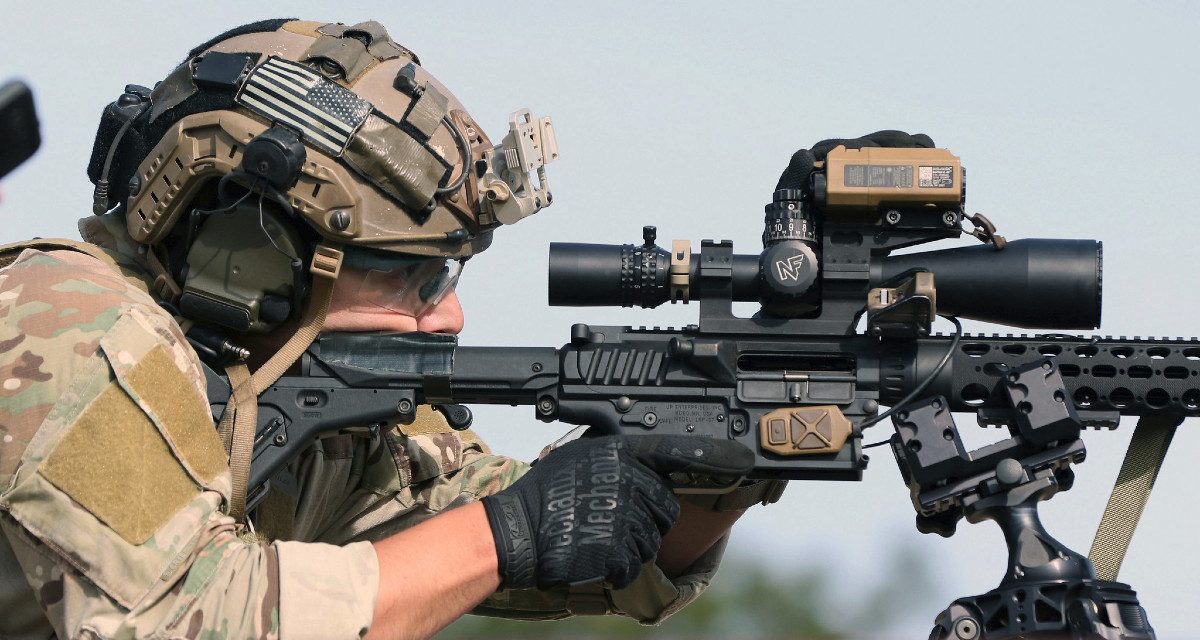In this episode of the MWI Podcast, Maj. Jake Miraldi speaks to Maj. Gen. Patrick Roberson. For most of his thirty-year Army career, he has served in the special operations community. In August 2019, he assumed his current role as commanding general of the Army’s John F. Kennedy Special Warfare Center and School. Before that, he commanded Special Operations Joint Task Force–Operation Inherent Resolve.
Given his recent leadership experience, he has an incredible perspective on special operations forces’ role in conflicts like the fight against ISIS. But he also talks about the future of US special operations forces and what these elite units can contribute in an era of competition with peer and near-peer adversaries.
Listen to the full conversation below, and be sure to subscribe to the MWI Podcast on Apple Podcasts, Stitcher, or your favorite podcast app. And while you’re there, please consider giving the podcast a rating or leaving a review!
Image credit: K. Kassens, US Army


Consider this simple (but hopefully not simplistic) basis for understanding peer and near-peer competition today:
The goal of our peer and near-peer adversaries, today, this is to defeat the U.S./the West; this, in much the same way that the U.S./the West defeated the Soviets/the communists during the Old Cold War.
Herein, the manner by which our peer and near-peer adversaries seek to do this today; this is in much the same way that "we" set out to defeat "them" back in the day, to wit: via a "containment" strategy:
In pursuing their such "containment" strategy against us today — much as we did against them in the Old Cold War — two important population groups stand out; these being:
a. One's "natural allies" in these such "containment" situations, to wit: those conservative groups — both within one's own country but also in the world at-large — who (given that they are "conservative") do not wish to either see, and generally will not allow, such political, economic, social and/or value changes as the expansionist/transformative/revolutionary entity (the U.S./the West of late; the Soviets/the communists in the recent past) seek/sought to achieve. And:
b. One's "natural enemies" as per this such "containment" strategy; i.e., the "liberal" elements of the populations, both in one's own country but also in the world at-large, who would happily embrace such political, economic, social and/or value changes as the expansionist/transformative/revolutionary entity (again, the U.S./the West of late; the Soviets/the communists during the Old Cold War) are trying to bring about.
As an example from the Old Cold War — of how the "containment" entity might exploit the "conservative" nature their "natural allies" — the following is offered:
"The overt attack on Afghan social values was presented, by the resistance forces, as an attack on Islamic values. This was also seen as an attack on the honor of women. The initiatives introduced by PDPA (the communist Peoples Democratic Party of Afghanistan) — to impose literacy on women and girls — inevitably raised questions as to the potential role of women outside the home. This provoked defensive actions from men, concerned with protecting the honor of women with their families, and to also ensure that traditional roles of women within the domestic sphere continued to be performed. It also generated fears that the important roles of women, as the primary vehicles for passing traditional and Islamic values from one generation to another, would be undermined if they were exposed to external and, particularly, non-Islamic values. This enabled the exiled radical Islamic parties to claim leadership of the resistance and to also declare a jihad.
(Item in parenthesis above is mine. See Page 58, Chapter 4 [The Soviet Military Intervention], of Peter Marsden's book "Afghanistan, Armies and Empires.)
Bottom Line Question — Based on the Above:
Given the "conflict environment" that I describe above (the New/Reverse Cold War, wherein the "conservative" Afghan, in this case, stood in the U.S./the West's expansionist/transformative/revolutionary way?) how should our special operations forces (etc.?) be trained, deployed and employed today; this,
a. So as to defeat the "containment" strategy of our peer and near-peer competitors? And to:
b. Achieve our transformative objectives?
Addendum:
In support of my contention above — that "containment" appears to be the strategy of our peer and near-peer competitors (and, indeed, that of our lesser opponents, N. Korea, Iran and the Islamists also?) — consider:
First, re: the reality of their "containment" strategy, the following from MG James Linder, et. al's "The Battlefield of Tomorrow Fought Today: Winning in the Human Domain." (See the major section entitled: "How We Fight: Shape, Deter, and Defeat.")
"Differing from the previous Tsarist regional empire and the Soviet globalist one, the new Russian foreign policy has a more pragmatic goal. It aims to build different types of buffer zones against NATO encroachment to the West and U.S. counter-terrorism efforts in Central Asia. …"
Next, as to my suggestion above that — re: such containment strategies — the liberal/pro-change populations are the "natural enemies" of our competitors and opponents (and, thus, our "natural allies?"), consider the following from GEN Votel, et. al, in their "Unconventional Warfare in the Gray Zone." (See the major section entitled: "Doctrine."):
"Advocates of UW first recognize that, among a population of self-determination seekers, human interest in liberty trumps loyalty to a self-serving dictatorship, that those who aspire to freedom can succeed in deposing corrupt or authoritarian rulers, and that unfortunate population groups can and often do seek alternatives to a life of fear, oppression, and injustice. Second, advocates believe that there is a valid role for the U.S. Government in encouraging and empowering these freedom seekers when doing so helps to secure U.S. national security interests."